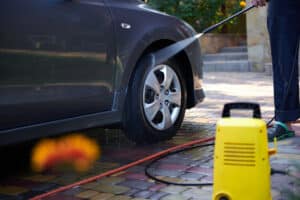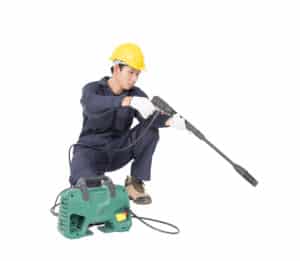What are the Advantages of Using a Gasoline-Powered Pressure Washer over an Electric One?
Key Takeaways
- Gasoline-powered pressure washers have higher power output, making them more suitable for heavy-duty cleaning tasks.
- Gasoline-powered pressure washers offer greater versatility and portability compared to electric models.
- Gasoline-powered pressure washers are known for their durability and longer lifespan compared to electric models.
If you are in need of a powerful cleaning tool to tackle tough stains and dirt, a pressure washer can be a great investment. However, when choosing between a gasoline-powered pressure washer and an electric one, it’s important to understand the advantages of each. In this article, we will explore the benefits of using a gasoline-powered pressure washer over an electric one.
1. More Power for Heavy-Duty Cleaning
One of the primary advantages of a gasoline-powered pressure washer is its higher power output. Gas pressure washers generally have higher psi (pounds per square inch) ratings and GPM (gallons per minute) rates compared to electric models. This higher power makes gas pressure washers more suitable for heavy-duty cleaning tasks.
With a gas pressure washer, you can easily remove stubborn grime, dirt, and grease from various surfaces, including driveways, decks, and siding. The increased power allows for a more effective and efficient cleaning process, saving you time and effort.
2. Versatility and Portability
Gasoline-powered pressure washers offer greater versatility and portability compared to their electric counterparts. As they don’t require a power outlet, gas pressure washers can be used in larger areas and remote locations. This makes them a perfect choice for outdoor cleaning tasks, such as cleaning your car, patio furniture, or outdoor surfaces.
The absence of a power cord also provides more flexibility during use. You can easily move around without being limited by the cord length or the need to find an electrical outlet. This makes gas pressure washers ideal for tackling large-scale projects or areas where access to electricity might be limited.
3. Durability and Longevity
Gas pressure washers are known for their durability and longer lifespan compared to electric models. These machines are built to withstand tough conditions and heavy use. They are often designed with robust components and sturdy frames, making them more resistant to wear and tear.
With proper maintenance, a gas pressure washer can last for about five to seven years, whereas electric models typically have a lifespan of three to five years. This longevity makes a gas pressure washer a more cost-effective investment in the long run.
4. Suitable for Outdoor Use
Gas pressure washers are specifically designed for outdoor use without any limitations. Unlike electric pressure washers that require a power cord, gas models can be used anywhere as long as you have gasoline to power them. This allows you to clean areas that are far from electrical outlets or in remote locations.
Whether you need to clean your outdoor patio, driveway, or other outdoor surfaces, a gas pressure washer offers the convenience and freedom to do so without being restricted by power cord length.
5. Lower Personal Risk
Due to their higher power output, gas pressure washers can complete cleaning tasks more quickly and efficiently. This means you spend less time in potentially hazardous situations, reducing the risk of accidents or injuries.
By efficiently removing dirt, grime, and other substances, gas pressure washers minimize the need to scrub or apply excessive force manually. This not only saves you time and effort but also lowers the risk of strain or injury from repetitive movements.
6. Low Maintenance
Gas pressure washers generally require less maintenance compared to their electric counterparts. They have fewer parts to maintain and replace, making them more straightforward to upkeep.
Typical maintenance tasks for a gas pressure washer include regular oil and filter changes, checking spark plugs, and inspecting hoses and connections for any leaks or damage. By following the manufacturer’s recommended maintenance schedule, you can ensure your gas pressure washer continues to operate at its best.
7. Affordable Options
Gas pressure washers come in a wide range of options at different price points, making them more affordable compared to electric models. The availability of affordable options allows you to find a gas pressure washer that suits your budget and cleaning needs.
Gasoline-powered pressure washers offer higher power output, superior durability, and a longer lifespan compared to electric pressure washers. While they may require more maintenance and produce more noise and emissions, the benefits they provide make them a popular choice for heavy-duty cleaning tasks and outdoor use.
Related Websites:
FAQs:
Q: What are the advantages of using a gasoline-powered pressure washer over an electric one?
Gasoline-powered pressure washers offer higher power output, enabling them to generate higher pressure and tackle tough cleaning tasks efficiently. They are also more portable as they do not require a power outlet or extension cords, making them suitable for remote locations or areas without electricity. Additionally, gasoline-powered pressure washers are versatile and can be used in various outdoor settings. They require regular engine maintenance and proper fuel storage, but they are ideal for heavy-duty or large-scale outdoor tasks.
Q: How does the power output of gasoline-powered pressure washers compare to electric pressure washers?
Gasoline engines generate higher pressure, resulting in increased cleaning efficiency and the ability to tackle tough tasks effectively. Electric pressure washers, on the other hand, have limitations in terms of power output due to their electric motors. This affects their cleaning capabilities, making them more suitable for smaller, indoor cleaning projects rather than heavy-duty or large-scale outdoor tasks.
Q: What are the portability advantages of gasoline-powered pressure washers?
Gasoline-powered pressure washers do not require a power outlet or extension cords, making them highly portable. They are suitable for remote locations or areas without electricity, allowing users to easily clean outdoor spaces without limitations. Electric pressure washers, on the other hand, are dependent on power sources and have limited cord length, restricting their usage to areas near power outlets.
Q: What are the limitations of electric pressure washers in terms of mobility?
Electric pressure washers have limitations in terms of mobility due to their dependence on power sources and limited cord length. They require a power outlet to operate, which restricts their usage to areas near power outlets. The cord length may limit the reach and maneuverability of the pressure washer, making it less suitable for cleaning in remote or large outdoor areas.
Q: Are gasoline-powered pressure washers more versatile than electric ones?
Yes, gasoline-powered pressure washers are more versatile. They can be used in various outdoor settings, making them suitable for a wide range of cleaning tasks. They are ideal for heavy-duty or large-scale outdoor projects. However, electric pressure washers are more suitable for smaller, indoor cleaning projects and may not be as ideal for heavy-duty or large-scale outdoor tasks.
Q: What are the maintenance requirements of gasoline-powered pressure washers compared to electric ones?
Gasoline-powered pressure washers require regular engine maintenance, including oil changes and proper fuel storage. They have slightly higher maintenance requirements compared to electric pressure washers. Electric pressure washers generally require less maintenance and upkeep due to the simplicity of electric motors and their reduced need for fuel management.
Q: What factors should I consider before choosing between a gasoline-powered and electric pressure washer?
Before making a purchase decision, it is important to consider your specific needs and preferences. If you require higher power output and the ability to tackle tough outdoor tasks, a gasoline-powered pressure washer may be the better option. On the other hand, if you primarily need a pressure washer for smaller, indoor cleaning projects and value ease of use and maintenance, an electric pressure washer may be more suitable. Assess your cleaning requirements, location, and available power sources to determine the best fit for your needs.





